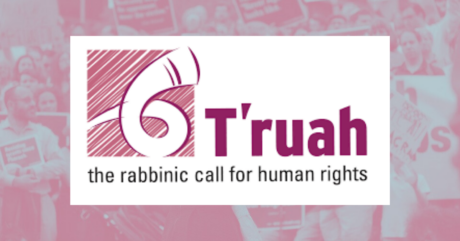NEW YORK – A new institute for Jewish thought is launching today. Emor, a project of rabbinic human rights organization T’ruah, will respond to the most pressing political and moral questions of our day and shape the public discourse with bold, creative Jewish ideas that inspire communities to act.
Emor is founded on the idea that the Jewish community has an important role to play in American society, public discourse, and policy-making. Millennia of Jewish texts contain the wisdom communities need to respond to the human rights concerns of today and tomorrow.
For decades, right-wing Jewish think tanks and institutes have promoted disingenuous interpretations of Jewish text and tradition, contributing to a broader backlash to racial justice, feminism, LGBTQ rights, and immigration. Emor will articulate a vision of a different, more just world grounded in progressive Jewish ideals and provide the thought leadership that vision demands.
The name “Emor”—“Speak!” in Hebrew—conveys the belief that words create worlds, and that we can empower individuals and organizations to speak up more effectively in the crucial debates of our day. The institute will generate and disseminate content and convene public conversations rooted in Jewish teachings that will support policies to expand human rights in the United States, Israel, and the occupied Palestinian territories.
“For thousands of years, Jews have debated the most consequential questions: how to create a just society, how to ensure the dignity and well-being of all people, how to engage with political authorities, how to build just political structures and how to lead a meaningful life,” said T’ruah CEO Rabbi Jill Jacobs. “Emor will draw on these generations of wisdom to offer direction for this moment and the future.”
The institute will add academic rigor, spiritual depth, and historical context to the current Jewish social justice ecosystem. Participants will include scholars and thinkers, leaders at Jewish social justice organizations, college students, policymakers, progressive leaders of all faiths and philanthropists.
Already, Emor has convened scholarly conversations among Israeli and American scholars about democracy, nationalism and human rights in a Jewish state. The institute also partnered with peer organizations to host an in-person symposium on democracy and Judaism. This spring Emor will publish Freedom, an online and single issue print magazine that reclaims the idea of freedom from those who seek to use it in order to compromise the safety, security and rights of others.
“Emor will offer a space to hold critical conversations about today’s most important moral and political issues,” said Sara Litt, Co-Chair of Emor’s Leadership Council and of T’ruah’s Board of Directors. “This generation and the next will be inspired by a Judaism that directly speaks to their values and to the major questions of our day.”
For more information on Emor, please visit emorinstitute.org.
T’ruah: The Rabbinic Call for Human Rights mobilizes a network of more than 2,300 rabbis and cantors from all streams of Judaism that, together with the Jewish community, act on the Jewish imperative to respect and advance the human rights of all people. Grounded in Torah and our Jewish historical experience and guided by the Universal Declaration of Human Rights, we call upon Jews to assert Jewish values by raising our voices and taking concrete steps to protect and expand human rights in North America, Israel, and the occupied Palestinian territories.

